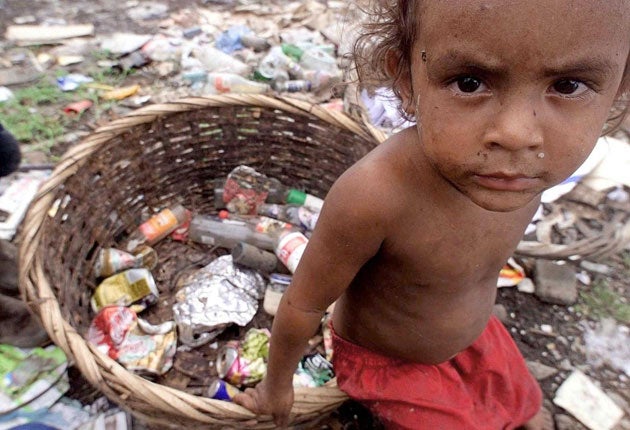You see them struggling along filthy side-streets on their battered crutches, or dodging their wheelchairs through traffic jams because central Managua's pavements are too pot-holed. Some stand begging at traffic lights; others tap their way across faded zebra crossings, helped by a white stick and no little courage.
The disabled are everywhere in Nicaragua. They make up a staggering 10 per cent of the population, caused by decades of war and natural disasters that have turned this beautiful mountain nation into the poorest country in mainland Latin America. Yet some see a bright sign of hope.
"Thirty years ago, if you were disabled you were locked indoors and never allowed out," Rosa Salgado tells me, with a flash of anger. "They were a taboo. Families felt ashamed, because society might laugh. We were called mangolitos [retards] and had no future. Now things are changing." Rosa should know. Just 45 years ago, at the age of two, she was crippled by polio. She could not walk without leg-irons and crutches. Born to poor parents, in a society without safety nets, she faced a grim future: mangolitos were barely citizens at all.
Yet Rosa has come a long way from the backstreets of Chinandega, the provincial city where she grew up. Today, she is one of Latin America's foremost disabled-rights activists, whose persuasive speeches have been made to hushed audiences across the globe, from Nicaragua's National Assembly building to the United Nations in New York.
The extraordinary journey shows how, with a helping hand in the right place, people such as Rosa can change the world. As the Nicaraguan government's first procurator [ombudsman] for disabled people, elected two years ago, her energy and plucky demeanour has transformed the lives of her 350,000 disabled peers.
On Tuesday, Rosa was in Jinotepe, a small town in the volcanic mountains between Managua and the Pacific, addressing public servants about their new obligations under the UN Convention for the Rights of Disabled People, a treaty she helped draft in 2006. She said Nicaragua must now make buildings accessible to wheelchairs, and offer equal employment rights to the disabled.
"The convention was signed in December, and our government was one of the first to sign," she said. "We ran a big campaign, and it gave the issue a huge profile. At the end, we just staged a sit-in in front of the National Assembly, to get support from enough MPs. And it worked. It has already changed so many lives."
That campaign, and the literature given to Rosa's audience which explained how the convention should be enforced, was part-financed by a grant from One World Action, one of the three charities supported by The Independent's Christmas Appeal.
One World Action helps disadvantaged people speak out for themselves across the developing world, believing that they are their own best advocates for democracy, and human rights. The charity trained Rosa in modern campaigning, helps fund her office, and allows her to collaborate with fellow activists who broadcast her story across the world.
Rosa has six siblings. Her father was a railway porter in Chinandega, before Nicaragua's entire railway network got sold off as scrap metal. Her mother was a street vendor. They lived in grinding poverty, relying on aid parcels for food. Yet although her two sisters worked with her mother, and her brothers helped their father, Rosa's parents bravely decided to send her to school.
"It was hard," she said. "When I fell over in school, everyone laughed at me. I went home crying. But my mother was a strong woman, and told me to never give up. She always had faith in me. She worked hard to help me get government scholarships, and I was able to finish my high school and get a university degree."
As Rosa grew up, Nicaragua fell to pieces. After decades of right-wing dictatorship under the Somoza family, it was taken over by Communist revolutionaries led by Daniel Ortega in the late 1970s. For much of the 1980s, the government was locked in a civil war with the Contras, the rebel group illegally financed by Ronald Reagan's White House. That left 30,000 dead, and tens of thousands more maimed. But its real legacy was financial: over the decade, Nicaragua's wealth declined by 80 per cent, until it became the poorest nation on earth. At one point, inflation hit 13,000 per cent. Rebuilding did not begin until the war ended, after Mr Ortega was defeated in an election by Violetta Chamorro in 1990.
Then Rosa began campaigning in Chinandega for disabled women. In 1995, she began being supported by Solidez, one of Nicaragua's few disabled rights groups (it too receives grants from One World Action). "For five years, we pressured the mayor," she said. "By the end, he had modified the streets and the kerbs, made the hospitals and public buildings accessible, and introduced Braille signs. Chinandega was the first place in Nicaragua to make these changes. After that, we moved to Managua and spread out across the country."
Today, Rosa also helps disabled people become productive members of society. "We run centres where people can learn. They receive instruction in hairdressing, textiles, or how to make cookies. It provides them with a living."
But in 2006, Mr Ortega regained the presidency, cementing power in municipal elections with the hallmarks of corruption: rioting voters, opposition parties arbitrarily banned, disappearing ballot papers and beaten investigative journalists.
In this turmoil, Rosa Salgado's independent spirit, and her determination to protect society's most disadvantaged, seems more precious than ever.
Subscribe to Independent Premium to bookmark this article
Want to bookmark your favourite articles and stories to read or reference later? Start your Independent Premium subscription today.


Join our commenting forum
Join thought-provoking conversations, follow other Independent readers and see their replies